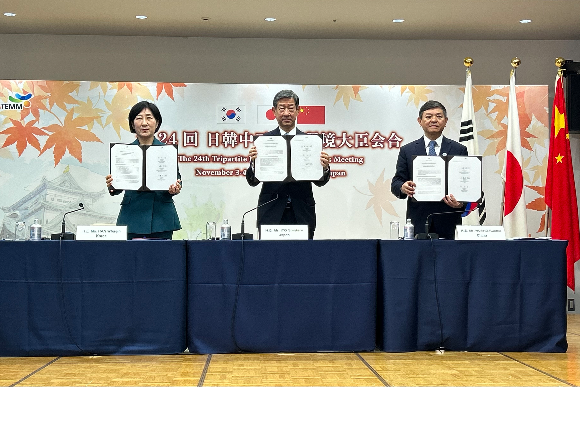Ministers call for proper handling of Fukushima nuclear-contaminated water
By Jiang Xueqing in Nagoya | chinadaily.com.cn | Updated: 2023-11-04 19:50

Chinese and South Korean environment ministers urged Japan to fulfill its international obligations, engage in full consultations with relevant stakeholders regarding the handling of nuclear-contaminated water, and provide all information accurately and transparently to the international community.
"The ocean is a common property of humanity. The disposal of nuclear-contaminated water is crucial for the global marine ecosystem and public health. Japan should faithfully fulfill its international obligations and engage in full consultations with relevant stakeholders, including neighboring countries, to handle nuclear-contaminated water in a scientific and responsible manner," said Chinese Minister of Ecology and Environment Huang Runqiu on Saturday at the 24th Tripartite Environment Ministers Meeting among Japan, South Korea, and China, also known as TEMM24.
"We also called for the prompt establishment of a long-term international monitoring mechanism with the participation of Japan, neighboring countries, and other relevant stakeholders to effectively protect the global marine environment," Huang said.
He made these remarks after Japanese Minister of the Environment Shintaro Ito said on the so-called ALPS treated water, Japan has claimed that there is no impact on people or the environment based on the results of monitoring. Japan will continue to ensure objective, transparent and credible monitoring, Ito said.
South Korea's Minister of Environment Han Wha-jin said during her meeting with Ito, she conveyed the views of the South Korean people regarding the disposal of nuclear-contaminated water.
"South Koreans are deeply concerned about the discharge of nuclear-contaminated water into the ocean and are very anxious about it. We emphasized that the South Korean government places the highest priority on the health of its people. We requested the Japanese government to adhere to a scientific approach in handling nuclear-contaminated water in accordance with international standards to prevent any harm to human health. We also urged them to provide all information accurately and transparently to the international community," Han said.
TEMM24, a two-day meeting which closed in Nagoya, Japan, on Saturday, discussed issues in key areas of common concern among the three countries, including climate change, biodiversity, sandstorm control and the prevention of marine plastic pollution.
"Asia is our shared home. China, Japan and South Korea are geographically close neighbors, sharing common cultural roots. In the face of regional and global environmental challenges, we are important cooperation partners that cannot be separated," Huang said.
























